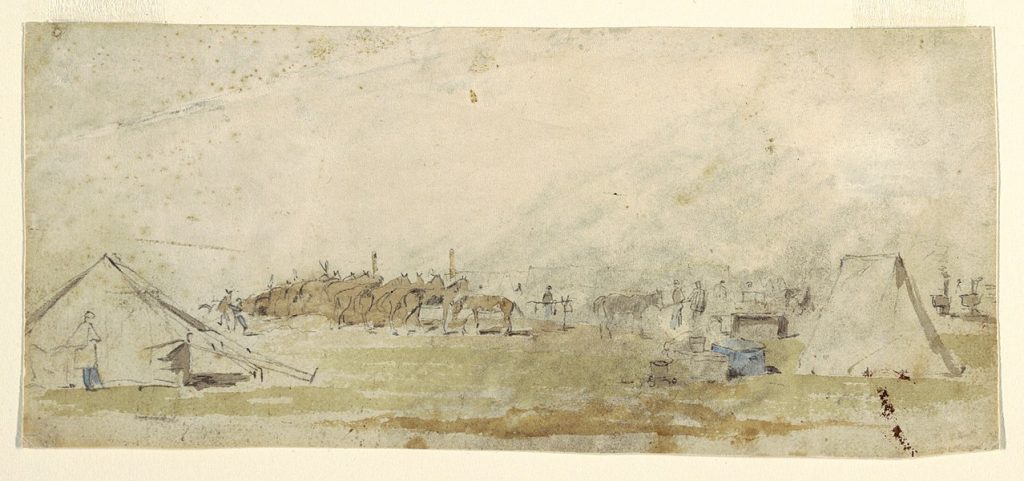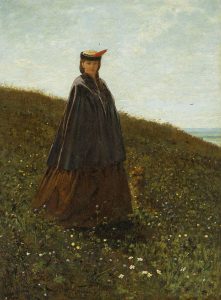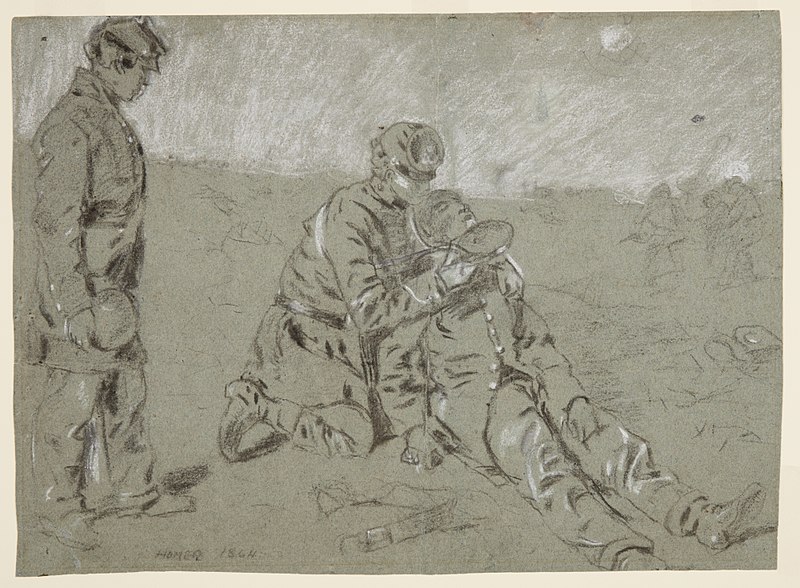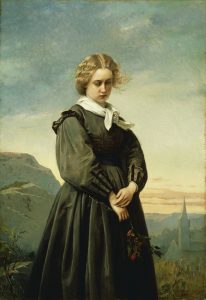“Because You Was Always True To Me”: A Union Soldier & His Sweetheart
 Dear Friend… I should like to sean [have seen] you before I enlisted, but I thought that you had something against me. But if I have said anything against you, I hope you will forgive me, for I thought that we used to be as good friends as could be found. I hope that you will not have any hardness [of] feelings against me, and I hope we may both live to see one another once more…[i]
Dear Friend… I should like to sean [have seen] you before I enlisted, but I thought that you had something against me. But if I have said anything against you, I hope you will forgive me, for I thought that we used to be as good friends as could be found. I hope that you will not have any hardness [of] feelings against me, and I hope we may both live to see one another once more…[i]
That’s how Peleg Bradford, Jr. wrote his first preserved letter to his sweetheart in October 1862, several months after he left home and enlisted. He had joined the 18th Maine Infantry Regiment which mustered into service on August 21, 1862, and was assigned to build and defend Washington’s fortifications. In January 1863, the regiment transformed into the 1st Maine Heavy Artillery and continued on fort duty around Washington until the Overland Campaign in 1864.
Bradford’s letters give a glimpse of a realistic “Civil War romance,” challenged by distance and threatened by physical wounds. Due to a full blog schedule yesterday [Valentine’s Day], these primary sources and observations will continue the discussion of romantic relationships during the 1860’s conflict for another day.
Age twenty when he enlisted, Peleg Bradford, Jr. had spent his youthful years working for his father on the farm, trying to make enough money to care for his mother and eight siblings. Bradford’s father struggled with alcoholism, making life difficult for the family. Throughout his Civil War letters, he tried to make sure his mother had enough money and advised her on some financial decisions. Troubles in childhood had educated young Bradford and taught him what he valued and wanted for his own future. The separation from family and friends during his enlistment, also helped him focus on his future plans.
One of his plans was to get married, but – unsure of his sweetheart’s feelings – he took his time before declaring his intention. Throughout 1862 and 1863, Bradford wrote to occasionally to his “dear friend” who was Cynthia McPherson, usually just informing her of his good health, the weather, and news about mutual friends from their hometown – Carmel, Maine.

In May 1863, Bradford commented on a friend’s wedding and made the observation to Miss McPherson that “I think that if the war lasts three years, theair [there] will not be any chance for me to get a woman.” In the same letter, he sends “respects” to her parents and tells her to let Mr. McPherson know how much he likes soldiering. In the saga of preserved letters, this is the first open hint at marriage and courting topics, starting by trying to impress the girl’s parents. Later, Bradford sends newspapers from Washington for Mr. McPherson. He never asked his other correspondents – Mother, Father, brothers, and sisters – about Miss McPherson, and some phrases imply they might have approved the match at first.
The letters went back and forth, and then the heartsick moment of all long-distance relationships happened in December 1863:

Dear Friend,
As I have not written you for along [a long] time, I will improve a few moments in writing to you. I am well and hope theas [these] few lines will find you the same. I should written to you before, but I got a letter from Carmel, and they told me that you was agoing to get married, and so I thought that if it was so, I would stop writing to you, but I thought that I would write you this letter to know about it.
I always thought well of you, and had maid [made] up my mind that when I got home that we would get married, if we could make things agreeable all around. I must now close, so good by.[ii]
Bradford wrote his slightly desperate, slightly hopeful letter on December 13, and by the 27th. he had received a reply from Miss Cynthia and wrote back to her. She had clearly refuted the rumor and wanted to know who had started it; her soldier responded:
…I will tell you who wrote that you was going to get married if you will promise me that you will not tell, for it is all past now. I will not tell you in this letter, but I will tell you the next time that I wrote. I suppose why they wrote that you was going to get married was to make trouble betwixt us, but since I read your letter, I know that it is all a dam [damn] lie, and I should not believe it now if my mother should write it, because you told me that you was not and whatever you tell me, I can believe, because you was always true to me Cynth.
I alwaysed loved you, and if you will be true to me, I will be true to you, and when I get home, we will get married, and then let them say what they will. The time will soon pass away when I shall be at home. We will write often, and the time will soon pass away. It is about a year and half longer that I have got to stop out here. I wish that I was home with you this winter instead of being out here…[iii]
With their engagement informally settled, Peleg Bradford and Cynthia McPherson corresponded more regularly and clearly enjoyed their communications; his letters often included repeated promises to “be true” and that he had always loved her. He started taking her advice about not re-enlisting (though that was his preference, too) and asking her opinions. In April 1864, it seems that Bradford got leave to return to Maine after his father died, and during that visit to Carmel, they were formally engaged, if their implied new relationship stage in the letters is correct.
With just months left in his enlistment, Bradford had yet to see battle. That changed during the 1864 Overland Campaign when the 1st Maine Heavy Artillery suffered some of the heaviest casualties of any unit in the Army of the Potomac. Bradford made it through his first skirmish with only a bullet’s “scratch,” but on June 7th, he was seriously wounded in the right knee, forcing a hospital amputation of that leg. And the future he had anticipated changed.

The first preserved letter he wrote to Cynthia after the injury implies that she had already heard about the wounded and amputation (probably from Bradford’s mother) and had written to him at the hospital:
Dear Friend,
I now improve a few moments time in writing to you. I am sitting up, but I don’t know how long I can sit up. You wanted to know how my leg got along. It is getting along first rate…
…Oh Cynthia – God knows how much I have suffered since I lost my leg, but it is getting along first rate now. I would like to write you a good long letter, but I can’t. I can only write short letters, so goodbye for this time.
From your ever true friend[iv]
Bradford wrote at least one other short note to Cynthia before penning a longer letter on August 20, 1864, addressing a serious subject:

…Perhaps you think that I have forgotten you by not writing to you oftener, but I have not. I think of you every day, but I hope you will not think hard of me as where I am at the present time [the hospital], but I hope the time will soon pass away and I can be at home with you, for I shall always hold the promise that I made when I was at home last spring, but as I am not, it would be better for you to brake [break] that promise, for when I made that promise I was a hol [whole] man, but I am far from it now.
I am not speaking of this any thing more than I think it is my duty, as I will do as I say, and that you know I will not say any thing more about it this time until I get home, and then we will talk the matter over and make it all right.
Someway I am asking to leave it all to with you, whatever you say I will do. That is a fair deal, is it not[?] Don’t get angry at what I say, will you[?]…[v]
Knowing that the loss of a leg changed his future abilities to provide for and care for a wife, Bradford honestly let Cynthia know that she could break their engagement and he would not hold it against her. His suspicion that she might be angry about the subject suggests he knew she would still want to marry, but he felt honor-bound to give her a way out, if she had changed her mind.
Happily, Miss Cynthia McPherson refused to break the engagement and welcomed her soldier home when he was released to go home to fully recuperate. Recovered, he returned to Washington to finish out his service commitment, taking Cynthia’s advice to not leave the military early since it might alter future benefits.
On October 7, 1866, Peleg Bradford and Cynthia McPherson married. It seems to be the beginning of a happy life together; they had eight children. Bradford built a sawmill and was active in local government.
The account of Peleg and Cynthia’s wartime romance is simple, almost understated. But they were sincere, and through rumors, long distance, and physical injury, their relationship survived and grew stronger. Their concerns about constancy and injury reflected situations facing many couples during the Civil War, but happily their love triumphed. In a progressing, written intimacy traced through details and the names “dear friend” to “Cynth,” the preserved letters chronicle the straightforward wooing and proposal of this Union soldier. Prior to the war, in the months in camp, journey to the battlefield, and transfer into the hospital wards, Peleg Bradford was lucky (and he knew it) because his love “was always true to me.”
[i] Bradford, Peleg. Melissa MacCrae and Maureen Bradford, editors. No Place for Little Boys: Civil War Letters of a Union Soldier, Goddess Publications, Brewer, ME: 1997. Pages 9-10 – October 8, 1862
[ii] Ibid., Page 64 – December 13, 1862
[iii] Ibid., Page 66 – December 27, 1863
[iv] Ibid., Page 91 – July 13, 1864
[v]Ibid., Page 98 – August 20, 1864
What a great story for Valentine’s Day! A folksy kind of Sullivan Ballou letter, but with a happy ending. Good for you for digging up the book containing his letters.
This fellow is my 1st cousin, 4 times removed. What a delight to find this post and share it with my sons. Thank you very kindly!
This was my great (not sure exactly how many greats) grandfather. My family was, at one point, in possession of these letters. My mother, Maureen Bradford, was one of the two editors that put the letters in order and published NO PLACE FOR LITTLE BOYS! Along with my father and other family members I will be buried with Peleg, Owen, and the whole bunch! Nice to meet you cousin!! (Or… whatever we’d be!)
Hi cousin Sara!! I would love to talk to you!! I’ve been trying to find some of Peleg’s other descendants to talk to!! I’ve tried messaging Maureen & also Melissa MacCrae on fb but it won’t let me message them b/c they’ve got the messaging turned off for people they aren’t friends with. Peleg’s oldest sister Sarah Helen Bradford is my 3rd (I think) great grandmother. I’ve got so many questions & I also might have some answers to some questions about Peleg & Owen that they family doesn’t know. I was actually born & raised in VA (both of my parents are from MA & ME). My oldest brother currently lives just a few miles from Petersburg & the Peebles Farm where Owen died & i grew up on the Chesapeake Bay about an hour or so east of Richmond. Ironically, years before we ever knew anything about Peleg & Owen, my little brother wrote a historical fiction book based on some old Civil War letters some kids found while exploring in the woods outside of Petersburg (very weird when we later found out about No Place for Little Boys!). My brother’s book was based off an actual story that happened to one of my coworkers back in the 1990’s. My coworker was combing through an old house that had long ago fallen down & he went & checked up into the chimney that had collapsed many years before & he found 2 Union uniforms in perfect condition with some letters still in the pockets & they were shoved up in this chimney. It turned out they were the uniforms of 2 young men who decided they’d had enough of the War & they ditched their uniforms & were headed back to their homes up north. My brother based his book off of that. His book is Somewhere Down the Line by Gregory Harris. I would really like to chat with u if at all possible. My email is vthokienc @ yahoo.com. I hope to hear from u!!!
Julianne Harris
Hi Sara, I Peleg was my great great grandfather. I was born in Dexter not too far from where he was buried. One of my Aunts is buried very close to him and my dad Robert Bradford lives close to Carmel.
David Bradford
Hi cousin Beth D!!! It’s nice to meet more family who are related to the Bradford’s & Waugh’s!!!
Hi Julianne,
I am Peleg’s Great Great Grandson. David Bradford. I just found out recently that about him.